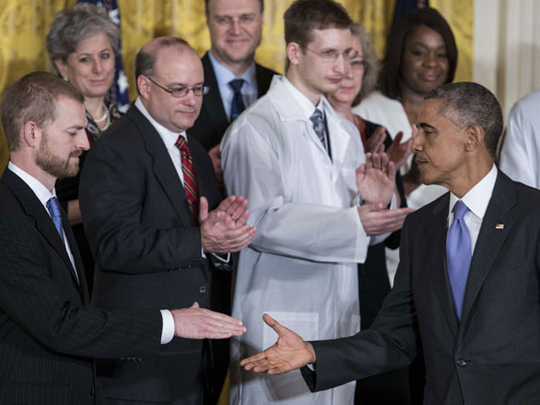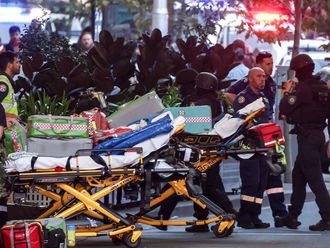
Tokyo: China is “vulnerable” to the deadly Ebola outbreak due to the soaring number of Chinese working in Africa and poor infection control at home, a co-discoverer of the virus warned Thursday.
Belgian microbiologist Peter Piot also warned experience with other viral outbreaks showed that airport screening was largely ineffective, and repeated his earlier criticism of the World Health Organisation’s “slow” response to the outbreak this year.
China is Africa’s largest trading partner and Beijing’s diplomatic footprint across the continent has expanded hugely in recent years as it seeks resources to drive the world’s number-two economy.
“Thousands and thousands of Chinese workers and people are in Africa now,” Piot told an Ebola-focused seminar in Tokyo.
“So it is not impossible that one of them will go (back) to China. I am more concerned about that than about Africans going to China.”
The quality of care at Chinese public hospitals was another concern, he added.
“I don’t think you can really stop people from travelling, so these patients will show up in any country in the world, but China I thought is quite vulnerable,” Piot said.
The Ebola outbreak ravaging west Africa has claimed 4,922 lives, according to the latest WHO update, with the vast majority of deaths in Liberia, Guinea and Sierra Leone.
Piot said that toll was more than three times the number of people who have died from Ebola over the past four decades.
The scientist, who co-discovered the virus in 1976 in Zaire, now known as the Democratic Republic of the Congo, called on countries to focus on containing the outbreak in west Africa, rather than largely-ineffective airport screening.
“In today’s globalised world, even if there is an epidemic thousands of thousands of miles from home, everybody of the world is at risk,” he said.
“We have seen important cases in Spain and the United States - this is kind of really unavoidable. The only way to prevent it is not closing borders and also screening passengers - that really doesn’t work - but it is to stop the epidemic there in west Africa.
“Many countries including the UK have started screening passengers coming from west Africa for fever and so on. Frankly, from a scientific perspective, it’s not very effective.”
Meanwhile, a nurse who vowed to defy Maine’s voluntary quarantine for health care workers who treated Ebola patients followed through on her promise Thursday, leaving her home for a bike ride.
Kaci Hickox and her boyfriend stepped out of their home on Thursday morning and rode away on mountain bikes, followed by state police cruiser.
Police were monitoring her movements and public interactions but couldn’t detain her without a court order signed by a judge.
Hickox contends there’s no need for quarantine because she’s showing no symptoms. She’s also tested negative for the deadly disease.
“I really hope that we can work things out amicably and continue to negotiate,” she said on Thursday morning while riding on a dirt trail.
There was no immediate comment from state health officials, who were going to court in an effort to detain Hickox for the remainder of the 21-day incubation period for Ebola that ends on November 10
It was the second time Hickox broke quarantine. She left her home on Wednesday evening briefly to speak to reporters, even shaking a hand that was offered to her.
“There’s a lot of misinformation about how Ebola is transmitted, and I can understand why people are frightened. But their fear is not based on medical facts,” Norman Siegel, one of her attorneys, said Wednesday.
Hickox, who volunteered in Sierra Leone with Doctors Without Borders, was the first person forced into New Jersey’s mandatory quarantine for people arriving at the Newark airport from three West African countries. Hickox spent the weekend in a tent in New Jersey before traveling to the home she shares with her boyfriend, a nursing student at the University of Maine at Fort Kent.
“I’m not willing to stand here and let my civil rights be violated when it’s not science-based,” she told reporters Wednesday evening.
Generally, states have broad authority when it comes to such matters. But Maine health officials could have a tough time convincing a judge that Hickox poses a threat, said attorney Jackie L. Caynon III, who specializes in health law in Worcester, Massachusetts.
“If somebody isn’t showing signs of the infection, then it’s kind of hard to say someone should be under mandatory quarantine,” he said.












